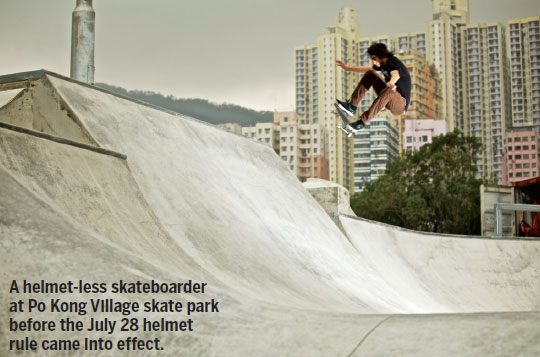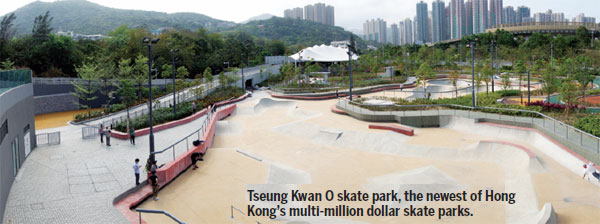Skateboarders flip over new helmet rule
Updated: 2014-09-22 06:11
By Simon Parry in Hong Kong(HK Edition)
|
|||||||||

It is a balmy summer's evening at one of Hong Kong's popular skate parks and temperatures are rising as exasperated security guards confront youngsters and order them to wear helmets or leave the multi-million dollar concrete enclosure.
Police are called as an agitated stand-off becomes more heated but leave without further action after mediating an uneasy truce between the two sides.
This scenario has been repeated a number of times in skate parks around the city since July 28 when the Leisure and Cultural Services Department (LCSD) began enforcing a rule to make safety helmets mandatory for skateboarders using the parks.
The rule triggered almost immediate opposition when it was introduced, said Warren Stuart, a veteran skateboarder and vice-president of the Hong Kong Federation of Extreme Sports, who says he warned LCSD officials what would happen in advance.
"In the most popular parks, kids have been coming in from all directions without helmets and security guards are helpless," he said. "At first, police were being called out all the time. They called the police so many times they were told by the police to stop bothering them.
"In the skate park in Fan Ling, they don't even bother trying to stop them anymore and they just make an (tannoy) announcement every 10 minutes to remind them that they should wear helmets."
The LCSD says it introduced the rule when the parks were opened up to BMX bikes and inline skaters and says the overall number of skate park users rose 28 percent year-on-year to 6,544 in August, the first month after the rule was brought in.
But Stuart says anecdotal evidence suggests the helmet rule is driving skateboarders away and skate parks are now sometimes deserted. "They (skateboarders) badmouth the government and say 'we'll just go back to the streets. We won't use the skate parks anymore'," he said.
Decrying the rule as unnecessary, Stuart said, "even though it appears to be dangerous, statistics show injury rates (for skateboarding) are much lower than for other sports.
"Eight people drowned swimming in Shek O last year but the LCSD doesn't enforce a lifejacket rule."
Skateboarding has boomed in popularity in Hong Kong over the past decade and the government has built a number of state-of-the-art skate parks, the latest one in Tseung Kwan O which opened in the spring.
Before July 28, skateboarders signed a form when they entered one of the city's 14 skate parks effectively taking responsibility for their own actions.
Rebellious youth culture
The new rule has brought bureaucracy into a head-on clash with an intrinsically rebellious youth culture, according to Paul O'Connor, a Chinese University anthropologist and skateboarder who has done academic studies on the sport's evolution.
"I have spoken to the LCSD and told them this is a very unpopular rule with skateboarders because they don't like to wear helmets," he said.
"If they are riding the big bowls where there are steep inclines or going downhill fast, they will wear helmets.
"But what street skateboarding has evolved to be is a lot of close-to-the-ground tricks - kicking the board up and flipping it round. Wearing helmets is unpopular in those styles of skateboarding."
O'Connor stressed, "we have world-class skate parks in Hong Kong. Tokyo doesn't have the resources we have for skateboarding. We have fantastic resources but they are being constrained and people aren't getting access to them, which creates a bad situation for the LCSD.
"There is a lack of recognition about the culture of the sport. The LCSD says 'We want to educate these skateboarders' but they are not going to do that.
"They have been trying to kick people off skate parks. Many kids turn up in the evening to skate without helmets and the police say 'It's your problem, it's not illegal'."
In a letter to LSCD Chief Leisure Manager (Sports Development), O'Connor warns that the helmet rule could inadvertently put youngsters in danger by driving them back onto the streets.
"Skateboarders are far more likely to become seriously injured on the streets than in LCSD parks," he wrote. "It would be most unfortunate if such accidents were to happen on the street because youths reject the LCSD rules of the skate park."
In a statement to China Daily, an LCSD spokesman said, "to meet the increasing demand for facilities of freestyle BMX, skateboarding and aggressive inline skating activities, the LCSD has opened up five venues for co-use by players of extreme sports."
The statement added, "for the sake of safety, the LCSD has worked with the sports associations on the rules and regulations for using the skate parks which require players to wear a safety helmet."
Asked if the helmet rule would be reviewed, the spokesman said the LCSD "will review the arrangements with the relevant sports associations in six months' time."
O'Connor believes that review should take place immediately. "The best skateboarding weather is arriving. It's cooling down. It's not too wet. This is going to be the worst time of year for them to have these parks not being used," he said. "It's terrible to have such great resources and to effectively block the use of these parks."
China Daily

(HK Edition 09/22/2014 page7)